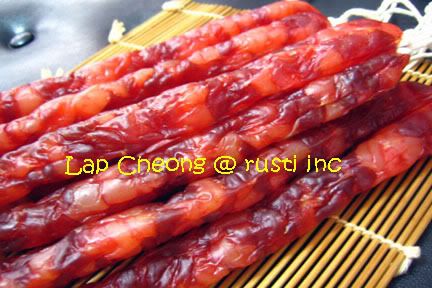
Yes, finally I am ready to post the recipe for the Lap Cheong, or Chinese Sausage.
Since I first posted Of Chinese Sausages & Hot Dogs and then Chinese Sausages Again , I have received many enquiries and requests for the recipe. I did not want to post the recipe then as I was not satisfied with the results. So after three tries, I am ready to share my recipe.
So for Jo of JoDeli, Lance, Vivien92130, the numerous Anonymous readers and my friends who either telephoned or emailed me, here is the recipe:
Ingredients:
350-400g fatty meat
1-1/2 tbsp Gao Liang wine
1kg Lean Pork (from the hind leg)
1 cup sugar
2-1/2tsp salt
2-1/2tsp msg (okay, I know some of you are opposed to msg. Omit if you wish)
1/2 cup Gao Liang wine
1-1/2tsp cinnamon powder
2tbsp fish sauce
Ponceau 4R (光红) food color or char siew food color
Sausage casings - about 5m
Things you will need: a funnel, a pin, parcel twine tied into loops, small strainer.
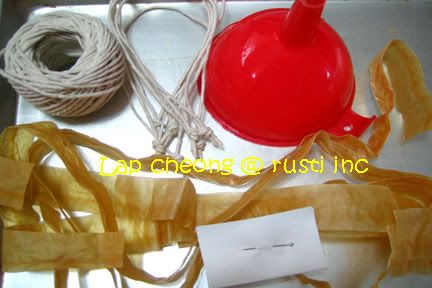
Method:
1) Absorb all excess water from the fats and cut into 1cm cubes.
2) Mix with the Chinese wine and leave in the fridge to marinate for at least 1 hour.
3) Absorb all excess water from the lean pork and cut into 1cm cubes.
4) Mix with the seasonings and leave in the fridge to marinate for at least 1 hour.
5) Cut the sausage casings into your desired length x 2 + 10-12cm for tying. Soak in water to soften. Give it a few squeeze under running water to remove any dirt and squeeze out excess water.
6) After marination, mix both the fats and lean meat together. Use the strainer to drain off excess marinating liquid before filling.
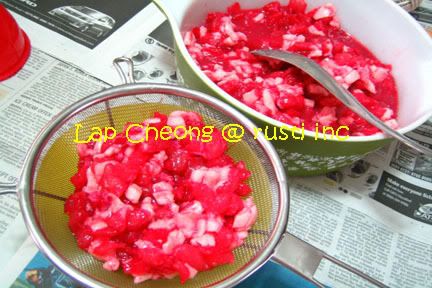
7) Tie one end of the casing, attach funnel to the open end and start to stuff the meat into the casing.
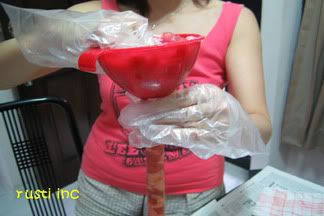
8) Ease the meat to the end of the casing as you stuff.
9) Use a pin to burst any air-pockets that forms between the meat.
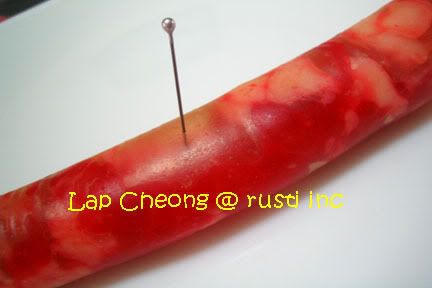
10)The meat must be quite tightly packed but do not overfill otherwise the casing may split open.
11) Once casing is filled, tie up the other end. Visually divide the sausage into half and twist it to make into 2 links. Tie the twine loop at the link.
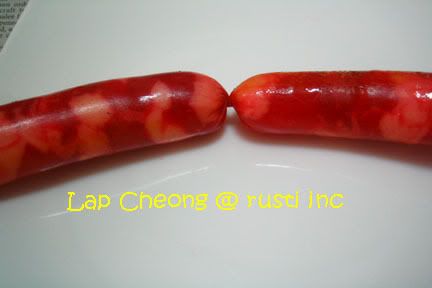
12) When all sausages have been filled, use a piece of clean cloth that has be wringed out of excess water to wipe down the sausages before drying them.
13) Dry by blowing with a fan at it's highest setting non-stop (yes non-stop). I blew the sausages for 48hours and then followed by another 48hours air drying.
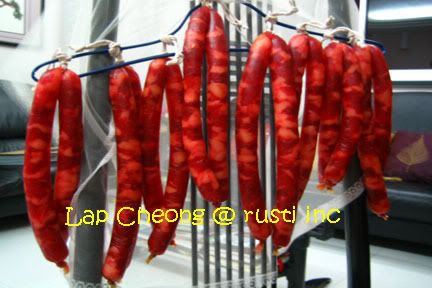
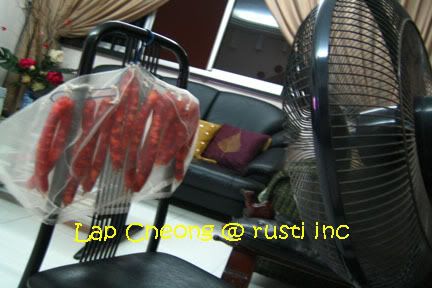
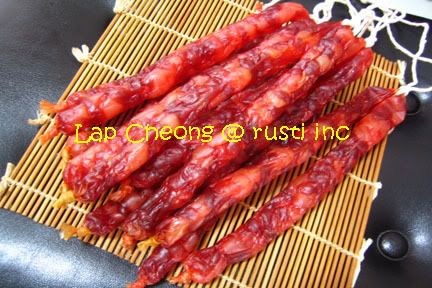
Note:
1) I cut my casings into 55cm length.
2) For the first knot, you can tie as close to the end of the casing as possible.
3) After filling, it is quite difficult to tie the second knot if you do not have sufficient casing left over. For me, I need about 7cm of casing to comfortably tie the knot.
4) When tying the second knot, do not tie too close to the fillings as you need to give some slack when you twist the length into two links. If you tie too close, your casing may burst due to the pressure applied when twisting.
5) Always inspect the filled sausages for air-pockets and burst them before twisting.
6) These sausages are not too 'sweet', if you prefer a sweeter sausage, you can either omit the fish sauce or add extra sugar.
6) I chose Gao Liang Wine because the alcohol content higer and it helps to prevent the meat from turning bad7) The above quantity yields 8 pairs of sausages based on a finished length of 22cm each sausage, which is longer than the commercial sausage.
8) As no preservatives is used in the process, please store the sausages in the fridge.
9) Sausage casings can be purchased from:
Chop Leong Aik Leong
Blk 333 Kreta Ayer Road #01-28
Singapore 080333
Tel: 6222-0234
Price is S$10/bundle of approx 5m.

26 comments:
Ginny, where to buy sausage casing?
Kellie, I have edited my blog to include the address.
you have a great blog!
The pictures are a good idea -- I really enjoy the one with the pin pricking the air bubbles.
aapplause applause
its very swee leh.. can i have a bite?? haha..
thanx for the recipe =)
Thank you so much for taking the trouble to share this 'long-forgotten' art. You're a gem. - natasya
oh yes. ginny .. thanks .. i just saw the address and price stated .. you are so thoughtful .. thanks so much !!! love all your bakes and yummies too!! :)
Thanks Rusti for the detailed recipe and instructions.
Btw, what is Gao Liang wine? Is it the brand? I used Chinese rose wine for my bak kwa. Do you think that will work?
Have to source for sausage casings too. Otherwise I'll have to wait for someone to bring it back from Singapore!
Thanks again for sharing!
Vivien92130
Vivien, Gao Liang Jiu is a type of Chinese white wine made from sorghum wheat. It is clear, unflavored and the alcohol level by content is about 54%-63%.
Yes, you can use Rose Wine. In fact the sausages will more fragrant as rose wine is a flavored wine. For your information, the alcohol level by content of rose wine is about 54%-55%
Thanks Ginny (Rusti) for the info. I don't know Mandarin (belong to the dialect-speaking era!) so it is hard for me when I'm buying things which have Chinese characters. All I know (learned from my sifu a long2 time ago) is to use rose wine for meats that have to be deep-fried, roasted etc and hua tiao wine for everything else. Is that correct?
That's interesting! I must research on this. The only other Chinese wine I have used is the Hua Tiao. I use it for all styles of Chinese cooking. If I am out of Hua Tiao, then I would use brandy. I have not tried Mei Gui Lu for cooking yet.
Rusti, thank you so much for sharing the recipe, the pixs and the info of how to do them. It really looks like the one they are selling!
Thanks once again.Lena.
Rusti,
Pardan me for my ignorance,I tot lap cheong was already cook when we bot from outside. From your recipe and pictures, looks like your lap cheong is raw rite?
Regards,
Jennifer
Jennifer, the commercial lap cheong are cured by either airing or smoking process. The meat is also raw. It is like salted fish, waxed meat etc.
I see...Thanks Rusti.:)
Regards,
Jennifer
Lance, I had the same thinking too. I guess, just like abalones and scallops, the drying process concentrates the meat juices thereby making the flavors more intense
Hi Ginny
I still haven't got down to making lap cheong. Just don't know where to get casing from in these parts. I may have to wait till someone goes back to Singapore to get it.
Btw, do you know how to make the sausage they sell at the roast pork/char siew stalls?
Hi Anonymous
No I do not have the recipe for char siew sausages but let me check with my sister. I think they use fresh pig intestines for the casing. Lots of work to clean them to get to the thin membrane.
Hi there!
Love your blog. I was wondering what kind of sausage casing did you use?
I'm a newbie to sausage making and can't tell the difference between collagen vs natural etc.
I will be buying this over the internet so it would help if you could be really specific. Thanks!!
Hi Anonymous
According to the vendor, the casing which I bought were dried pig intestines. I have never used any other types of casings so I cannot tell you how to tell the difference. However I do know there are some which comes salted and it is a bit damp. I suppose those are use for those Western sausages if you know what I mean.
Ginny
Hello Rusti! I found this blog in Foodista and followed it here. This is a lovely blog and awesome Chinese Sausage recipe. Only one question, does it really have to have a fatty meat? I mean can I roget about the fatty meat part? By the way you can place more Foodista widget in your past and future blogs so that other Foodista readers can follow and see your blog too. Just search for a related recipe or food in Foodista and use its widget. I hope to read more from you. Cheers!
Hi Christine
I would not advise to leave out the fats entirely although technically you could do so. If it is all lean meat, you will end up with a very dry and 'hard' sausage. You could try mincing the meat (instead of cubing) and then reduce the fats. I suppose it will be softer then but I have not tried it.
Ginny
Great post. I just tried calling the shop listed above and they said they didn't have sausage casings. Do you know if they are still available there or somewhere else? Thanks.
Hi Jeff
Sorry to hear that the shop no longer carries the dried casings. I don't know where else to buy them in Singapore and I would like to know too. I have found fresh casings for western sausages at The Butcher in Chip Bee Gardens. You can see my Oct 26, 2011 posting on fresh Chirizo sausages.
Hi May I know where can I purchase gao liang jiu in Sg?
thanks
Zoe
Hi Zoe
You can get Gao Liang Jiu from Yue Hwa or Sheng Siong. Did you managed to find the dried sausage casings becos I can't seems to get them lately. Please let me know.
Hi Zoe
You can get Gao Liang Jiu from Yue Hwa or Sheng Siong. Did you managed to find the dried sausage casings becos I can't seems to get them lately. Please let me know.
Post a Comment